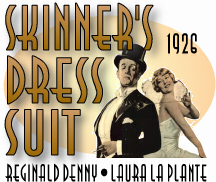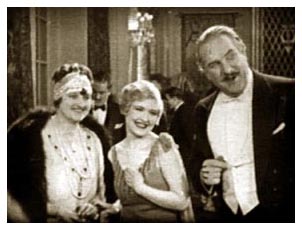

Universal
Cast: Reginald Denny (Skinner), Laura La Plante (Honey), Ben Hendricks
Jr. (Perkins), E.J. Ratcliffe (Skinner's boss, McLaughlin), Arthur
Lake (office boy, Tommy), Hedda Hopper (Mrs. Colby), Lionel Braham
(Jackson), Henry Barrows (Mr. Colby), Frona Hale (Mrs. McLaughlin),
William H. Strauss (the tailor), Lucille Ward (Mrs. Jackson)
Skinner has a good job, a cozy home and a beautiful wife, Honey who adores him - a perfect scene of domestic bliss.
However, domestic bliss is a very temporal thing that is inevitably disrupted by the most innocent, everyday occurences. In this case, it's Honey's impatience at her hubby's reluctance to ask his boss for a raise. Skinner thinks it would be better for his boss to bring up the subject first. Honey, who has poor Skinner wrapped around her finger, has the perfect solution, "All you have to do is demand a raise, and you'll get it!"
As a result of his wife's prodding,
Skinner eventually works up enough nerve to ask his boss for a
raise.
Unfortunately, his timing is terrible. The company has just lost
the Jackson contract, so Skinner's request for a raise elicits
a  resounding, "No!" from
the boss.
resounding, "No!" from
the boss.
The dejected husband returns home to a special dinner Honey has prepared in celebration of the expected raise. Rather than asking if he got the raise, she asks, "How much?" The dinner, his wife's optimism, her worshipful confidence in him . . . it's more than the average man can bear. He just can't disappoint her and fabricates a $10 per week raise. This is all Honey needs to hear to go on a spending rampage - "Time flew and so did Skinner's money while Honey bought and bought and bought - on the installment plan."
Skinner reluctantly resigns himself to Honey's desire to spend his nonexistent money in order to join the "smart set." Because clothes make the man, the first of these purchases on the installment plan is a new dress suit for Skinner. The dress suit, as well as a new outfit for Honey, is needed to attend the upcoming reception for their new pastor which will be hosted by the elite Mr. and Mrs. Weston Colby. "The Colby's being Meadsville's social leaders - nobody could afford to stay away, even if they couldn't afford to go!"
Skinner and Honey are the hit of the reception. Their mastering of the latest dance steps has all the guests struggling valiantly to learn the "Savannah Shuffle." This unexpected popularity endears them to everyone, especially the Colbys. Soon Skinner is riding to work with the affluent Mr. Colby in the mornings, and Honey is hosting bridge parties attended by Mrs. Colby and her wealthy friends. This foray into the world of the social elite creates more expenses, and Skinner soon finds himself with bill collectors at the front and back door - including his tailor who actually demands the return of the partially paid dress suit! As if the mounting debt were not enough, Skinner loses his job. There's bad luck and there's good luck. Poor Skinner has had enough of the former. Could there be some of the latter in his future?
Back in 1926, in an article entitled "The Cinema: Lesser Glories," Iris Barry observed, "A newer figure is Reginald Denny. His films are definitely delightful and extremely funny, not farces like those of Lloyd or Keaton, but real, light comedy, from which the plaguery humor of dress suits, dance partners and domestic and business life in general is deftly extracted. I warmly recommend 'What Happened to Jones?' and 'Skinner's Dress Suit,' two of his films now imminent."
Barry's comments sum up what's wonderful
about "Skinner's Dress Suit." The humor comes from believable
characters in everyday  situations. Complications
arise from acts of Fate that could happen to any of us and often
do. In An Evening's Entertainment, The Age of the Silent Feature
Picture, 1915-1928 (University of California Press, 1990),
author Richard Koszarski said, "'Skinner's Dress Suit' .
. . confidently displays a sophisticated style unknown only two
years earlier."
situations. Complications
arise from acts of Fate that could happen to any of us and often
do. In An Evening's Entertainment, The Age of the Silent Feature
Picture, 1915-1928 (University of California Press, 1990),
author Richard Koszarski said, "'Skinner's Dress Suit' .
. . confidently displays a sophisticated style unknown only two
years earlier."
The charm of "Skinner's Dress Suit" is not solely due to a series of humorous situations, though. Reginald Denny is an underrated, master comedian who, with a few subtly-played facial expressions, can bring out a situation's fullest potential for humor. Watch Denny's reactions in the scene where he learns Honey has bragged to the neighbors about the non-existent raise -- they're priceless. He is adept at turning commonplace situations into hilarious episodes, too. One of the most comical scenes in the film has a secretary at the office showing Skinner how to "Savannah Shuffle." His less than graceful, yet enthusiastic, attempts at dancing are hysterical, especially when the boss walks up behind him, and she can't get him to stop.
With his spirits undampened by a scowling boss, Skinner calls Honey on the phone and tries to explain how to do this new dance he has just learned. Of course, Skinner can't simply convey his instructions verbally, he has to perform the motions as if his wife were able to see him. The scene is a comic delight as it switches back and forth between Skinner wiggling his derriere as he impatiently tries to explain the dance steps and Honey swinging her hips as she tries to interpret her husband's instructions.
In The Parade's Gone By (University of California Press, 1968), Kevin Brownlow relates his experience when he screened the film for Reginald Denny and his family in the 1960's. Denny was somewhat reluctant to view the film at first, apparently afraid it would "creak," he said. However, after hearing the laughter of those viewing the film that evening, he admitted that it "held up" better than he thought. Certainly, he was being modest. Nevertheless, Brownlow insists that much of Denny's success should be credited to William A. Seiter who was his director for five years. Denny himself noted that Seiter "appreciated" his style of comedy, and he spoke well of their working relationship.
Denny needn't have worried about the
film's ability to work with modern audiences. Another 40+ years
have passed since Brownlow screened the film for him, and it still
doesn't fail to hold one's interest and entertain. Actually, Denny's
comedy is somewhat of a surprise for  those
who are only familiar with silent comedy through the likes of
Chaplin, Lloyd, Keaton or Langdon. Apparently the collaboration
of Denny and Seiter "clicked" resulting in successful
comedies that were closer in style to what was to come 10 or 20
years later in the movies eventually evolving into the early TV
"situation" comedies. In describing Seiter, William
K. Everson said in American Silent Film (De Capo Press,
1998), "Seiter's work had taste and charm, and he had the
happy knack of being able to present contemporary life and human
foibles in dramatic or amusing ways, without distorting them or
blowing them up to typically Hollywoodian proportions." Of
"Skinner's Dress Suit" specifically, he said, "(It)
holds its own today as a charming, funny and realistic comedy
. . ."
those
who are only familiar with silent comedy through the likes of
Chaplin, Lloyd, Keaton or Langdon. Apparently the collaboration
of Denny and Seiter "clicked" resulting in successful
comedies that were closer in style to what was to come 10 or 20
years later in the movies eventually evolving into the early TV
"situation" comedies. In describing Seiter, William
K. Everson said in American Silent Film (De Capo Press,
1998), "Seiter's work had taste and charm, and he had the
happy knack of being able to present contemporary life and human
foibles in dramatic or amusing ways, without distorting them or
blowing them up to typically Hollywoodian proportions." Of
"Skinner's Dress Suit" specifically, he said, "(It)
holds its own today as a charming, funny and realistic comedy
. . ."
As noted, the style of comedy in "Skinner's Dress Suit" could be regarded as slightly ahead of its time. It reminds one of the famous movies series of the 1930's and 1940's such as Andy Hardy and Blondie (incidentally, look for future "Dagwood" Arthur Lake as the office boy, Tommy). With no television, audiences obviously wanted to see more of their favorite characters in new and different situations. Likewise, it only takes one viewing of "Skinner's Dress Suit" to fall in love with these characters and want to see more of them. It's just a shame there weren't sequels to this classic comedy. One can only guess if this film had come along 10 years later or during the television era, would it have spawned a series? Reginald Denny's subtle comedic style would have made him perfect for such a cinematic endeavor . . . except for one thing. He was English, and, although he enjoyed a successful career for many years into the sound era, because of his English accent, he was limited to butlers and characters of the "Continential" variety. It is fortunate for us. however, that this wonderful (and highly underrated comedy) has survived to enjoy today.
Laura La Plante's contribution to this film must be emphasized, too. Her perky charm adds to the film's success and shouldn't be underestimated. Any husband would be hard pressed to disappoint a wife like Honey who snuggles up and coos adoringly, "my big, handsome, successful husband . . ." She is a determined bundle of enthusiasm with unswerving faith in her husband. La Plante was a perfect fit as Honey for two reasons -- one, she was married to Seiter, and, two, she and Denny were accustomed to working together. Prior to "Skinner's Dress Suit," she had been personally selected by Denny to appear with him in "Sporting Youth" (Universal, 1923), which was followed by "The Fast Worker" (Universal, 1924). She was Universal's number one feminine star for several years, and Joe Franklin (Classics of the Silent Screen, Cadillac Publishing Co., 1959) noted that her "good humor and neat timing" were well-suited for comedy, but she also "made a most fetching damsel-in-distress in 'The Last Warning' and 'The Cat and the Canary' . . ."
Be sure and also check out "California Straight Ahead" (1925) and "The Cheerful Fraud" (1927), two more of Denny's wonderful comedies that are available for viewing today. "California Straight Ahead" is particularly good, especially if you like a little slapstick thrown in. It includes a runaway trailer containing Denny and his partying friends that dashes down a mountain road, an otherwise calm night that evolves into a sidesplitting comedy spree when a windstorm and escaped animals from a circus take over an auto camp, a cross-country trip with every imaginable problem, and a very exciting auto race for a climax. (See more on "California Straight Ahead" as a "Silents Are Golden Feature of the Month")
Copyright © 2004, by Tim Lussier. All rights reserved.